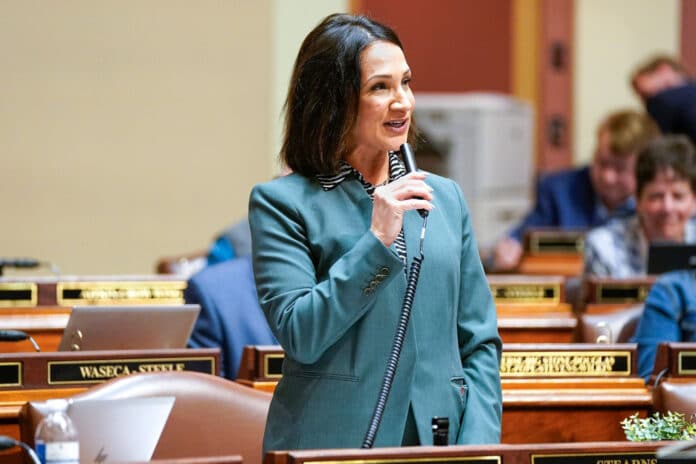
Republican legislative leaders are calling on the Minnesota Department of Human Services and other state agencies to investigate contracts they had made with organizations run by individuals charged in the $250 million Feeding Our Future food fraud scandal.
The Minnesota House Republican Caucus issued a statement Thursday highlighting new revelations reported by the Minnesota Reformer that show nearly half of the 60 people charged in connection with the widespread Feeding Our Future fraudulent scheme also had contracts with various state agencies, including the Department of Human Services.
“The overlap between the Feeding Our Future fraudsters and businesses contracted with state agencies like DHS is disturbing and needs to be immediately investigated,” said Rep. Lisa Demuth, R-Cold Spring, who serves as minority leader for the House GOP.
“House Republicans have been warning of this exact scenario — fraud doesn’t exist in a vacuum and there are known correlations between those defrauding the federal nutrition program and other state government grant programs,” Demuth continued. “It is inexplicable why this scandal hasn’t been taken more seriously and why there hasn’t been clear steps taken to ensure these fraudsters are not also defrauding other state programs.”
The Reformer story, published Thursday, reports that 26 of the individuals charged in connection with the Feeding Our Future food fraud had contracts with various state agencies, primarily the Department of Human Services. To date, the federal Department of Justice has charged 60 people with various criminal counts related to the scandal, including wire fraud and money laundering.
The scandal has been widely reported on by local and national media since January 2022, but it wasn’t until last fall before anyone associated with the scheme was charged with a crime.
On Sept. 20, 2022 U.S. Attorney Andrew Luger announced that 48 individuals had been charged with multiple counts related to the scandal that involved Twin Cities-based Feeding Our Future distributing nearly a quarter billion dollars to dozens of organizations that were accused of fraudulently running food programs to communities in need.
In mid-January 2022, FBI agents raided the offices of Feeding Our Future, along with homes and distribution sites for the organizations it had partnered with after the FBI began investigating claims that the organization was handing federal dollars it received from the U.S. Department of Agriculture to organizations that were fabricating the numbers of reported meals they were distributing to children and vulnerable adults. The funding Feeding Our Future received came from the USDA’s “Summer Food Service Program” and the “Child and Adult Care Food Programs.”
These programs provide reimbursements for meals distributed to low-income children by food sites, like schools, nonprofits, restaurants, and more. Each food site must have a sponsor organization, in this case Feeding Our Future. The food sites submit reports on how many meals they are serving to the sponsor organization, which then submits the reports to the government for reimbursement.
In Minnesota, the federal reimbursements are wired to the sponsor organizations via the Minnesota Department of Education. The sponsor organization then disburses the money among the food sites.
Now that more than two dozen of the individuals charged in connection with the Feeding Our Future scheme have been revealed to have contracts with DHS and other agencies, legislators want immediate action by those agencies to investigate what happened to the taxpayer dollars the state distributed to those programs, Demuth said.
“DHS and other state agencies must immediately investigate all contracts with any ties to Feeding Our Future fraudsters,” Demuth said. “Every day that goes by without action is another day that taxpayer dollars could be going out the door to sham causes instead of going towards helping individuals in need.”
The House Republicans’ call for DHS to investigate those state contracts comes just a few weeks after Minnesota’s GOP congressional delegation — Tom Emmer, Brad Finstad, Pete Stauber, and Michelle Fischbach — sent a letter to USDA Secretary Tom Vilsack criticizing the federal agency for being “wholly evasive” and ignoring document requests regarding the Feeding Our Future scandal.
DHS also in hot water over new email deletion policy
Demuth’s call for DHS to investigate those suspects’ contracts with the state comes just days after Republicans in the House and Senate denounced DHS for its decision to shorten its data retention policy from three years to just one year. DHS now automatically deletes all its emails from its archives when they are more than a year old, provided they don’t contain official records. That new policy began this month, much to the consternation of legislators and government transparency advocates.
Ranking Republicans who serve on the state Senate’s legislative audit commission, data practices commission and health and human services committee asked Gov. Tim Walz to step in and have DHS reverse the policy.
“We are calling on Gov. Walz to live up to his claim that his administration is the most transparent that Minnesota has ever seen,” said Republican Sens. Warren Limmer, Mark Koran and Paul Utke in a joint statement last week. “He should instruct his commissioner to halt the new email policy immediately and begin working with policymakers and stakeholders for a better way to protect privacy, retain important government communications, and manage email data storage.”
DHS officials have said the decision to shorten the deletion period from three years to one was made to ensure its employees’ email inboxes “did not become repositories for large volumes of private data that are difficult to manage and at risk of a data breach.”
Hank Long
Hank Long is a journalism and communications professional whose writing career includes coverage of the Minnesota legislature, city and county governments and the commercial real estate industry. Hank received his undergraduate degree at the University of Minnesota, where he studied journalism, and his law degree at the University of St. Thomas. The Minnesota native lives in the Twin Cities with his wife and four children. His dream is to be around when the Vikings win the Super Bowl.











